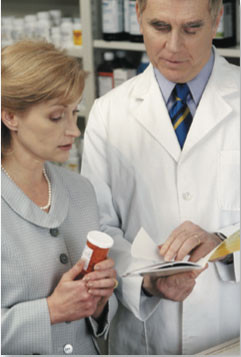
Respiratory health harms often follow flooding: Taking these steps can help

Tips to leverage neuroplasticity to maintain cognitive fitness as you age

Can white noise really help you sleep better?

Celiac disease: Exploring four myths

What is prostatitis and how is it treated?

What is Cushing syndrome?

Exercises to relieve joint pain

Think your child has ADHD? What your pediatrician can do

Foam roller: Could you benefit from this massage tool?

Stepping up activity if winter slowed you down
Heart Health Archive
Articles
Cellphone safety with a pacemaker
People who have a pacemaker or an implantable cardioverter-defibrillator (ICD) should keep cellphones and smartphones at least five to seven inches away from the device. Doing so helps prevent the rare possibility of interference between the two devices.
Afib cases increasing; pay attention to underlying health conditions
Atrial fibrillation (afib) is affecting far more people than it did 50 years ago, according to a study published July 11, 2015, in The Lancet. Afib is an irregular heartbeat that makes the heart's upper chambers (the atria) quiver, rather than pump steadily. This can lead to the formation of blood clots, which can travel in the blood to the brain and cause a stroke. The Lancet study found that afib cases quadrupled from 1958 to 2007 among 9,500 people. But there is some encouraging news: the study also found that the risk of stroke associated with afib decreased 74% in the last 50 years, and the risk of death decreased 25%.
Why the ups and downs? Researchers point to epidemics of obesity and diabetes as part of the reason, as well as increased awareness of the condition and better detection methods. Meanwhile, improved recognition and treatment of other diseases, such as high blood pressure, may be helping to reduce the cases of stroke and early death linked to afib. So, this study provides further evidence of the importance of maintaining a healthy weight and keeping blood sugar, blood pressure, and cholesterol under control. In addition to reducing the risk of heart disease, stroke, diabetes, and other illnesses, you also reduce the risk of getting afib and developing complications from it.
Having a dog can help your heart — literally
Dog lovers know how much warmth and comfort their canine companions add to their lives. But they might not know that a growing body of evidence suggests that having a dog may help improve heart health.
Pet ownership, especially having a dog, is probably associated with a decreased risk of cardiovascular disease. This does not mean that there is a clear cause and effect relationship between the two. But it does mean that pet ownership can be a reasonable part of an overall strategy to lower the risk of heart disease.
Heartburn and your heart
| Image: Bigstock |
Proton-pump inhibitors offer welcome relief for people with chronic heartburn. Here's what you need to know to use them wisely.
Heartburn didn't get its name by accident. Although the problem stems from excess stomach acid rather than heart-related issues, it provokes searing pain focused directly behind the breastbone. Of the over eight million emergency room visits for chest pain each year, severe heartburn, also known as gastroesophageal reflux disease (GERD), accounts for over half the cases in which actual heart problems are ruled out.
Can LDL be too low?
Ask the doctor
Q. After a year of taking a statin, my LDL cholesterol measurement is 50 mg/dL, which seems awfully low. Is there any downside to a very low LDL?
A. Based on what we currently know, a low-density lipoprotein (LDL) level of 50 mg/dL appears to be reasonably safe, especially when attained naturally. Studies of people who've already had a heart attack suggest that lowering LDL to about 50 mg/dL provides further protection against recurrent cardiovascular events versus reaching a level of around 70 mg/dL. In studies lasting up to seven years or so, these lower LDL levels appeared to be well tolerated.
New studies support statin guidelines
Discuss your own situation and preferences with your doctor when deciding whether to take a statin. Image: Thinkstock |
But if you are healthy, deciding if these commonly prescribed drugs are right for you is a personal choice.
The journey toward heart disease
Breaking up your daily exercise into three 10-minute bursts can be as effective as 30 minutes of continuous activity. Image: Thinkstock |
Exercise and lifestyle changes can thwart heart failure down the road.
Abdominal aortic aneurysms: What you need to know
Targeted screening and improved repair techniques may minimize the danger of this uncommon condition.
With a diameter roughly the size of a garden hose, the aorta is the body's largest artery. It curves out of the heart through the chest, passing straight down the center of the body before dividing into the arteries that serve the legs (see illustration).

Respiratory health harms often follow flooding: Taking these steps can help

Tips to leverage neuroplasticity to maintain cognitive fitness as you age

Can white noise really help you sleep better?

Celiac disease: Exploring four myths

What is prostatitis and how is it treated?

What is Cushing syndrome?

Exercises to relieve joint pain

Think your child has ADHD? What your pediatrician can do

Foam roller: Could you benefit from this massage tool?

Stepping up activity if winter slowed you down
Free Healthbeat Signup
Get the latest in health news delivered to your inbox!
Sign Up










